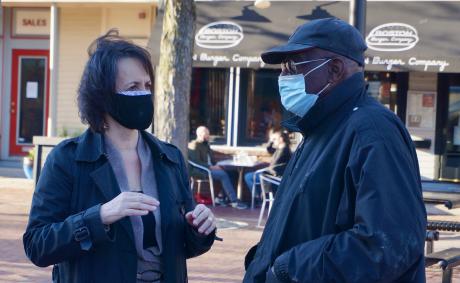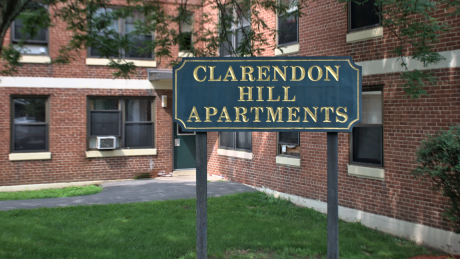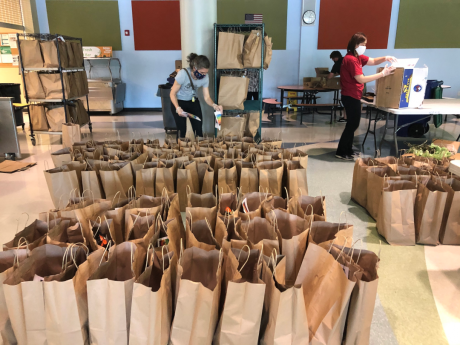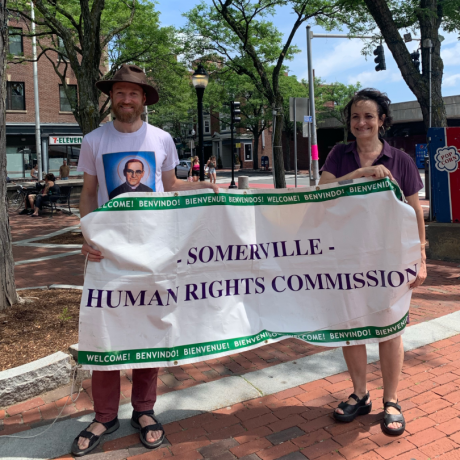In her seven years on the city council, Katjana has led the charge in Somerville through her environment-conscious zoning initiatives and other path-breaking ordinances, like LEED Platinum building efficiency requirements for large, new development, the Native Planting Ordinance, and Somerville’s Green New Deal, authored and sponsored by Katjana. Katjana’s successful work on the environment has made our city an exemplar in using zoning to combat climate change, in restoring natural urban ecosystems, and she'll place Somerville among the first cities in the nation to declare carbon-negative goals, setting an example for other municipalities and the Commonwealth to follow.
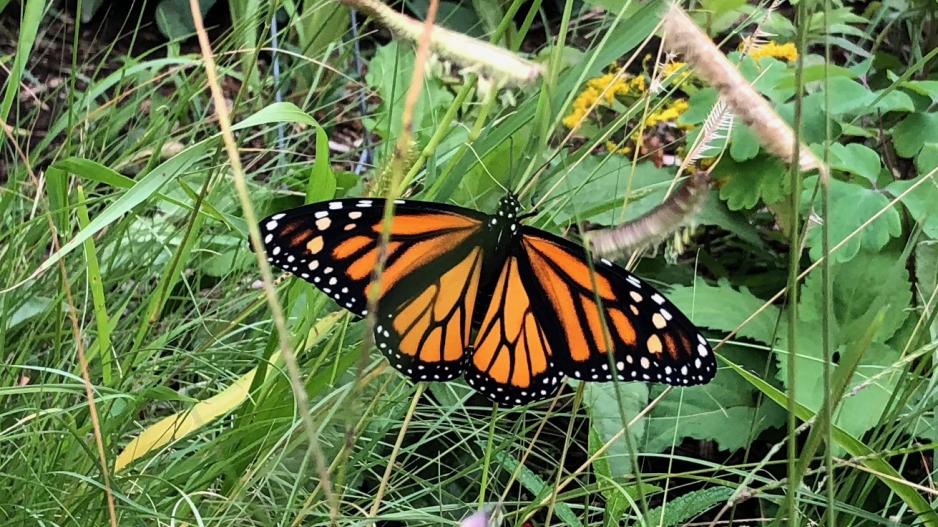
Katjana's Leadership on the Environment
Katjana's Climate Change Combat Plan
A Healthy Environment is a Human Right
Everyone in our community has a right to clean air and water. Everyone needs and deserves a healthy natural environment that cools, cleans, and provides habitat and recreation space. Everyone should have access to affordable and energy-efficient housing, and to low-emission, multi-modal transportation. Reducing and reversing the effects of climate change is a matter of immediate concern, enlightened self-interest, and mutual obligation.
Katjana will work to make these rights a reality for every resident of Somerville. As mayor, Katjana will tap into the creativity, knowledge, and experience of our residents and businesses; and she will inspire Somerville to continue our national leadership in combating and reversing the unfair, ugly, destructive, and expensive effects of climate change.
Create Equity Not Displacement
As we work to green Somerville, Katjana will also work to prevent the displacement that is often caused by "green gentrification." To read more about Katjana's two decades of accomplished leadership on affordability, and her initiatives to prevent displacement, read Katjana's Affordability Plan.
Call to Action
For every one of us, our response to climate change is literally existential. Failure to address this challenge will destroy our quality of life, undermine our health, cost us billions of dollars in damaged productivity, and kill millions of people around the globe. As a matter of health, comfort, and economic stability, we must work to solve these problems both in our actions as a society and in our personal commitments. And, as we move to meet this existential challenge, we must also address the long-standing, systemic inequities imposed on the most vulnerable among us by past policies of environmental neglect and negligence.
The damage to our changing climate, caused by emissions from burning fossil fuels and rapid deforestation, is already serious. By 2070, Somerville could experience temperatures of 90 degrees or higher for 90 days each year. Storms will be more frequent and more destructive: In the same time frame, most of Massachusetts will experience 11 or more additional “precipitation events” per decade that exceed 4 inches of rainfall within 48 hours. The state’s major urban areas, including Metro Boston, are projected to experience additional precipitation events on this scale at a rate of up 19 additional events per decade.1
Paradoxically, these intense storms won’t result in significantly higher amounts of rain. Even as seasonal flooding increases and coastal water levels rise, droughts will be more frequent and last longer. Our natural environment - flora and fauna - will struggle to survive, creating adverse impacts on agriculture and on human habitat. We will all experience significant damage to our health, economic security, and quality of life, and these burdens will fall more heavily upon our most vulnerable residents, the frontline communities least able to cope with them.
1 “Costs, Regulation, and Financing of Massachusetts Water Infrastructure: Implications for Municipal Budgets,” Office of the Massachusetts State Auditor, 2017, page 11
Carbon Negative Somerville
Katjana will lead Somerville to create achievable, practical carbon reduction targets rooted in current data and science. Instead of achieving carbon neutrality by 2050; Somerville will work to become a carbon-negative city by 2050. At the same time, Katjana will work to create environmental equity for residents disproportionately affected by the climate crisis.
So, what does carbon-negative mean for Somerville? It means that, as a community, we will take more carbon out of the air than we put in. To achieve carbon negative status will require using readily available, cost-effective technologies and construction techniques to make our buildings, transportation, and electricity carbon-free. Carbon negativity will require using nature-based solutions to sequester carbon by increasing our green canopy (even more trees), restoring wetlands and marshes, and adding green roofs wherever practicable in new construction.
"Katjana had the vision to imagine what a just transition looks like when she passed the Green New Deal for Somerville in 2019...she consistently reaches out to diverse groups. She is not afraid to roll up her sleeves and dig into wonky policy details.”
Action Points
Address Environmental Justice Corridors
Eliminate public health and safety consequences for people living near high volume traffic corridors. Air pollution along these corridors equates to disproportionate rates of chronic illness (like asthma and heart disease) and vulnerability to novel viruses (like Covid-19). Poor traffic design prioritizes commuter vehicles over pedestrians crossing the street or commuting by bicycle. Katjana will prioritize implementing an accessible, safe, “complete streets” strategy over city-controlled thoroughfares and work with our state delegation to levy pressure on State agencies to create remediation on State roads.
More Green + Open Space
-
Plan, acquire, improve more green and open space
-
Vegetable gardens, open to all
-
Mitigate air pollution near-highway recreational spaces
-
Sequester carbon via Miyawaki forest, and grass, instead of artificial turf
-
Explore alternative grounds maintenance methods (like goat herds to maintain green space)
-
Create connected walking paths throughout the city
-
Implement wetland stormwater filtration systems
-
Create a stormwater assessment (modeled off of heat smart/cool, smart, or Mass Save) to assist residents to minimize stormwater run-off and ease flooding by using rainwater collection, rain gardens, and diversion techniques
-
Retrofit our existing athletic fields with transportive, carbon-sequestering grass with non-toxic maintenance
Encourage "Fifteen-Minute" Neighborhoods
Car-free access to basic needs including:
-
Fresh affordable produce/groceries
-
Shaded natural, green space
-
A safe, affordable, multi-modal public transit network
-
Local, accessible "complete streets"
-
Public health needs, including an extreme weather resilience hub
-
A variety of local businesses
-
Community centers + social spaces
Katjana will organize community-led planning sessions to rethink how we plan our neighborhoods to focus on community needs over-development needs.
Electrify Everything
Our electrical grid is transitioning away from fossil fuels, and we should do everything that we can to encourage that transition. Renewable energy will reduce emissions, provide cleaner indoor air, minimize heat-related illnesses, and reduce energy costs. Katjana work to expand proven programs such as Solarize Somerville, Community Choice Electricity, HeatSmart/CoolSmart. These initiatives successfully leverage the City's buying power to provide lower-cost energy improvements for residents.
Embrace Renewable Energy
Infuse + Localize Renewable Energy
-
Develop microgrids, especially for subsidized housing
-
Retrofit all subsidized housing to North American "Passive House" standards
-
Offer training programs for residents to become building performance compliance testers, with union participation; home energy cost disclosure, wastewater, heat recovery
-
Increase the default rate for cce from 10% to 100%, with reduced rates for qualifying households. With the grid moving to 100% renewable, this is a short-term program to add embodied carbon limits to the zoning code.
-
Require a life-cycle cost analysis (LAC)/embodied carbon reporting with a municipal cap on embodied carbon. This can include infrastructure (i.e. adding glass to concrete as the ad-mixture content reducing cement volume)
-
Foster public-private partnerships for municipal geothermal/ground source energy to replace gas as a heating source (and help current gas workers transfer their skills to the geothermal industry)
-
Require high-performance, energy-efficient building designs and and require regular recertification for ongoing performance
-
Advocate for federal housing policy to create incentives for energy- and location-efficient decisions.
Microgrid energy options provide low-cost renewable energy, such as community solar, right-of-way geothermal, wastewater heat recovery and cooling, and wind. Somerville's creativity combined with Katjana's effective, inclusive leadership can turn these practical, cost-effective energy options into working realities. Katjana will explore public-private partnerships to bring affordable energy to all residents, building on and expanding into programs like Community Choice Electricity and HeatSmart/CoolSmart, and transitioning utility infrastructure repair.
Connect Universal Broadband
Too many in our community do not have reliable access to the internet, putting them at a disadvantage for school, work, and participation in community activities. Katjana will explore public-private partnerships to bring broadband access to all residents, modeling the City's proven success with Community Choice Electricity.
Lead by Example
Initiate Green Entrepreneurship + Training Programs
- Create a native plant city nursery to supply city plantings, operated by frontline community residents for training and a living wage
- Work with our vocational educators to develop a Career and Technical Education (CTE) program for landscaping, gardening, horticulture, arborist training
- Establish a Mayor’s youth job summer program for invasive weed pulling
- Coordinate with state, union and educational officials to promote workforce development and transitional skills training for green construction, building maintenance for energy-efficient buildings, solar installers, auto mechanic skills for electric vehicles, etc.
Inform, Educate, Inspire
- Inform residents and city staff regarding land stewardship, diversity of land use
- Living simpler and more efficiently: lessons of circular economy (tool libraries, seminars on repair, giveaway free groups)
- Support school curricula - climate change, environmental justice + outdoor education experiences
- Expand recreation options to provide greater opportunities for all community groups
-
Incentives for residents to reduce personal carbon footprint
-
Depaving - advertise, eliminate permitting fees, free or low rent tools
-
Free/subsidized public transportation, routes planning for equity
-
Incentives for home/landowners to plant and care for native trees on their property, remove invasives, maintain private green spaces Subsidies, incentives, and/or finance for energy efficiency retrofits
City Buildings, Land + Vehicles
- Deploy a municipal compost program
- Staff knowledge and experience with the local ecosystem
- Train DPW personnel in ecosystem restoration
- Commit to state-of-the-art green street design
- Tree canopy equity/urban heat equity
- Commit to 100% native plants on all city property Involve community-led voices for implementation
Manage Waste
Reassess the cost and efficacy of recycling and trash management, especially for items that frequently do not actually get recycled due to single-stream contamination
- Employ single stream for the big three valuable materials - cardboard, glass, aluminum
- Improve waste wizard to reflect non-city options to dispose of styrofoam, etc, that can be recycled elsewhere (e.g. currently waste wizard says to trash styrofoam when local companies will take it)
- Research large-scale recycling options for laminated cardboard institute municipal curbside compost (rat control, too!)
- Compostable materials for take-out and delivery packages opt-in single-use items for take-out and delivery (i.e. condiments, utensils, napkins)
- Cradle-to-cradle waste stream management (product stewardship, i.e. encourage online/mail-order retailers/Amazon to provide compostable packaging or to collect waste packaging - the anti-externalization law). Build upon Somerville's successful, total plastic bag ban
Merge + Unify Built and Natural Environments
- Air pollution mitigation, planned into all developments.
- Use the natural environment to increase the longevity of the built environment
- Native species in fresh development and new or updated playing fields to meet carbon capture metrics (carbon sinks) and to serve as “green infrastructure," i.e. stormwater capture systems
- Natural elements such as bio-swale bleachers and rain gardens
- Measure the economics of natural systems (e.g. savings of stormwater charges from rain gardens, cost to residents from heat islands)
- PV (generation) or maximum vegetative canopies (sequestration) to cover municipal parking lots. Similar streetscape generation and canopy strategies.
- PV paving for roads/paths
- Rolling upgrades of existing conventional infrastructure to "green infrastructure”
- Productive Land Use Ordinance to reward vegetative or solar installations on disused areas
Legislate
Policies + Ordinances
Evaluate policies and ordinances where needed, strengthen:
- Native Planting Ordinance
- Tree Preservation Ordinance
- Leaf Blower Ordinance
- Somerville Climate Forward
Create new policies and ordinances as needed, including:
- A new Green Roof Ordinance
- An Open Space Preservation Ordinance
At the State and Federal Level:
- Advocate with our state and federal delegations to pursue expanded policies for public transportation, building/stretch code, air pollution measures (including air pollution barriers along I-93 and a photovoltaic canopy on the Green Line)
- Through the Mass Municipal Association, the Metropolitan Area Planning Council and other regional organizations, push for energy-efficient freight operations with regional freight planning, institute “pass-thru” pollution caps and promote "no-idling" laws
- Reinvest revenues from state and federal programs like the Regional Greenhouse Gas Initiative and the Transportation and Climate Initiative in environmental justice communities
- Expand transit opportunities in existing corridors such as the Urban Ring
- Collaborate with local tech/lab companies on new environmental and sustainability solutions
- Make Somerville a test city clean green technology innovation
Read more about Katjana's leadership on the environment here: Katjana's Leadership in Combating Climate Change. Watch testimonials of local climate activists, Renee Scott and Larry Yu, and others, here.
